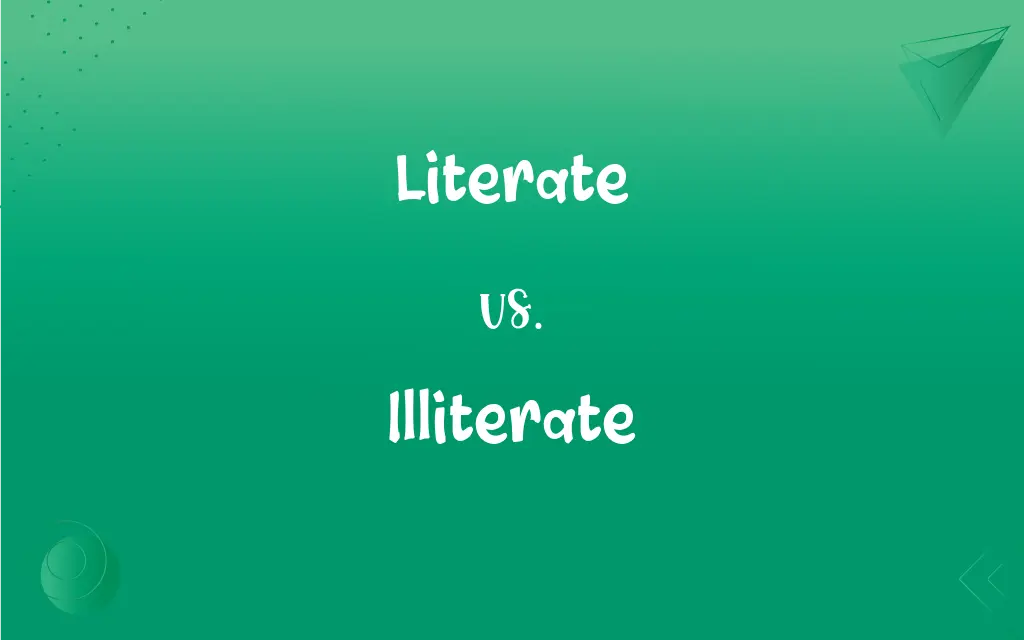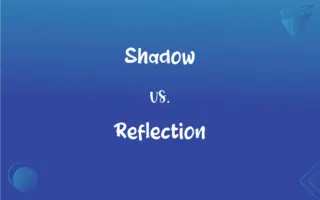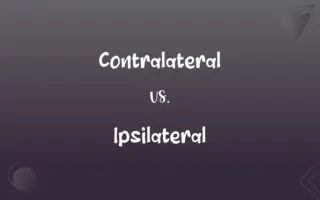Literate vs. Illiterate: What's the Difference?
Edited by Aimie Carlson || By Harlon Moss || Updated on November 3, 2023
Literate means able to read and write; illiterate means lacking the ability to read and write.

Key Differences
A literate person has the ability to read and write, which is fundamental for communication and education. Literacy enables individuals to engage with written content, be it books, articles, or digital media. An illiterate person, conversely, does not have this ability, which can hinder their access to information and reduce their opportunities in modern society.
In terms of skills, being literate often implies a certain level of education and cognitive ability to comprehend and interpret text. Literacy is not just about reading and writing but also includes numeracy and digital literacy in the contemporary world. Illiteracy, however, is not just the absence of these skills but can be a barrier to personal development and understanding complex concepts.
From a societal perspective, literate populations tend to have better job prospects and economic outcomes. Literacy allows for informed decision-making and active participation in democratic processes. Populations with a higher rate of illiteracy may struggle with poverty and exploitation due to a lack of access to knowledge and the tools needed to navigate legal and financial systems.
The concept of literacy has evolved, now encompassing cultural and critical literacy, which refers to understanding and engaging with societal and cultural contexts. This contrasts with illiteracy, where there might be a disconnect with prevailing cultural narratives and an inability to critically engage with media.
Efforts to combat illiteracy focus on education and access to learning resources. Literacy programs aim to equip individuals with the skills needed to function effectively in society. Where illiteracy prevails, it is often due to a lack of these educational resources or systemic barriers that prevent individuals from learning.
ADVERTISEMENT
Comparison Chart
Definition
Able to read and write.
Unable to read and write.
Education
Has received basic education.
Lacks basic educational skills.
Employment
Better job opportunities.
Limited job opportunities.
Social Participation
Can engage in societal discussions.
Often excluded from societal discourse.
Digital World
Can navigate digital environments.
Faces challenges in digital navigation.
ADVERTISEMENT
Literate and Illiterate Definitions
Literate
Informed.
The literate voter researched all candidates before voting.
Illiterate
Uninformed.
Being illiterate can leave a person uninformed about current events.
Literate
Educated.
A literate person can appreciate classic literature.
Illiterate
Unfamiliar.
He remained illiterate in digital technology, struggling with even basic tasks.
Literate
Knowledgeable.
Being computer literate is essential in today's job market.
Illiterate
Incapable.
Illiterate people often feel incapable of handling bureaucratic paperwork.
Literate
Cultured.
He is literate in all forms of art, from painting to music.
Illiterate
Uneducated.
An illiterate individual may have never attended school.
Literate
Competent.
She is financially literate, managing her investments wisely.
Illiterate
Uncultured.
Without literacy, a person might be considered uncultured in literary circles.
Literate
Able to read and write.
Illiterate
Unable to read and write.
Literate
Knowledgeable or educated in a particular field or fields.
Illiterate
Having little or no formal education.
FAQs
What defines a literate person?
Someone who can read and write.
Can literacy impact employment?
Yes, literacy typically enhances job prospects.
Is being literate the same as being educated?
Being literate is a fundamental part of being educated.
Is literacy confined to language?
No, it includes numeracy and digital skills as well.
What does illiterate mean?
It means lacking the ability to read and write.
How can illiteracy affect health?
It can lead to challenges in understanding health information.
Is illiteracy always due to lack of education?
Often, but not always; it can also be due to lack of access or disability.
Do literate parents influence children's literacy?
Yes, they play a significant role in their children's literacy development.
Are literate people always book readers?
Not necessarily, but they have the ability to do so.
Can illiterate people vote?
They can, but may not be fully informed on the issues.
What's digital literacy?
It's the ability to use digital technology effectively.
Can illiterate people be successful?
Success is possible but literacy improves chances.
Does illiteracy affect children and adults alike?
Yes, it impacts individuals across all ages.
Is literacy the same across the world?
No, literacy standards can vary by country.
Does technology impact literacy?
Yes, technology requires and fosters certain literacy skills.
Is illiteracy linked to poverty?
Illiteracy and poverty often correlate.
Is illiteracy a problem in developed countries?
Yes, it exists everywhere, albeit at different rates.
Can illiteracy be eradicated?
With education and resources, illiteracy rates can be reduced.
Can illiterate people access digital content?
They may struggle without literacy skills.
Is literacy a human right?
Yes, it's considered a fundamental human right.
About Author
Written by
Harlon MossHarlon is a seasoned quality moderator and accomplished content writer for Difference Wiki. An alumnus of the prestigious University of California, he earned his degree in Computer Science. Leveraging his academic background, Harlon brings a meticulous and informed perspective to his work, ensuring content accuracy and excellence.
Edited by
Aimie CarlsonAimie Carlson, holding a master's degree in English literature, is a fervent English language enthusiast. She lends her writing talents to Difference Wiki, a prominent website that specializes in comparisons, offering readers insightful analyses that both captivate and inform.































































